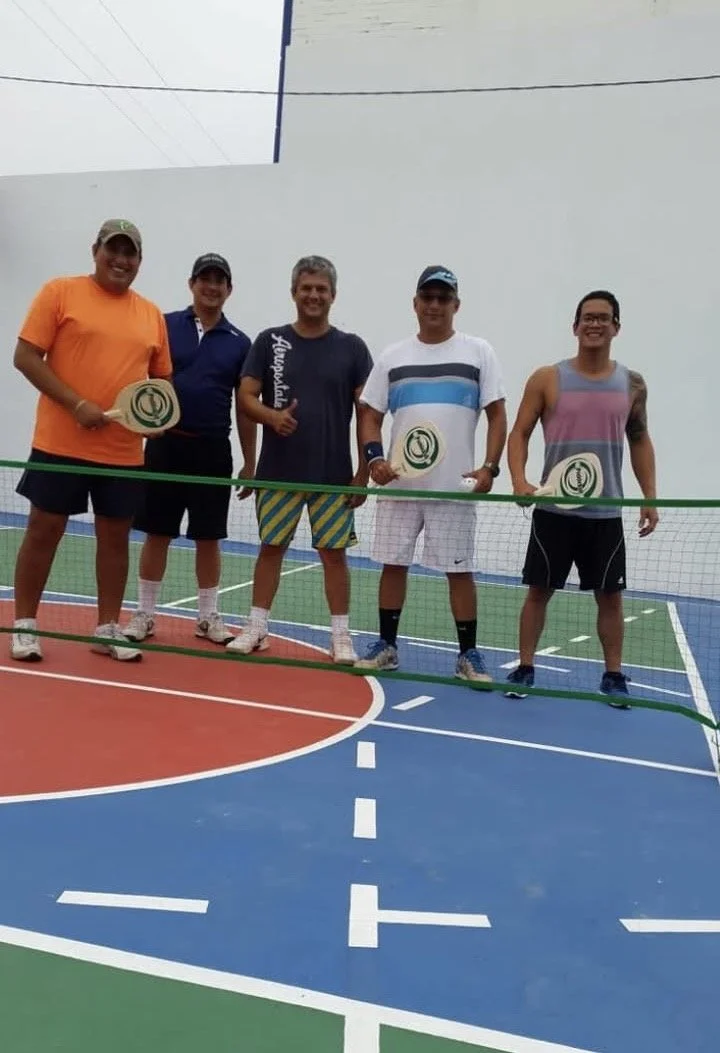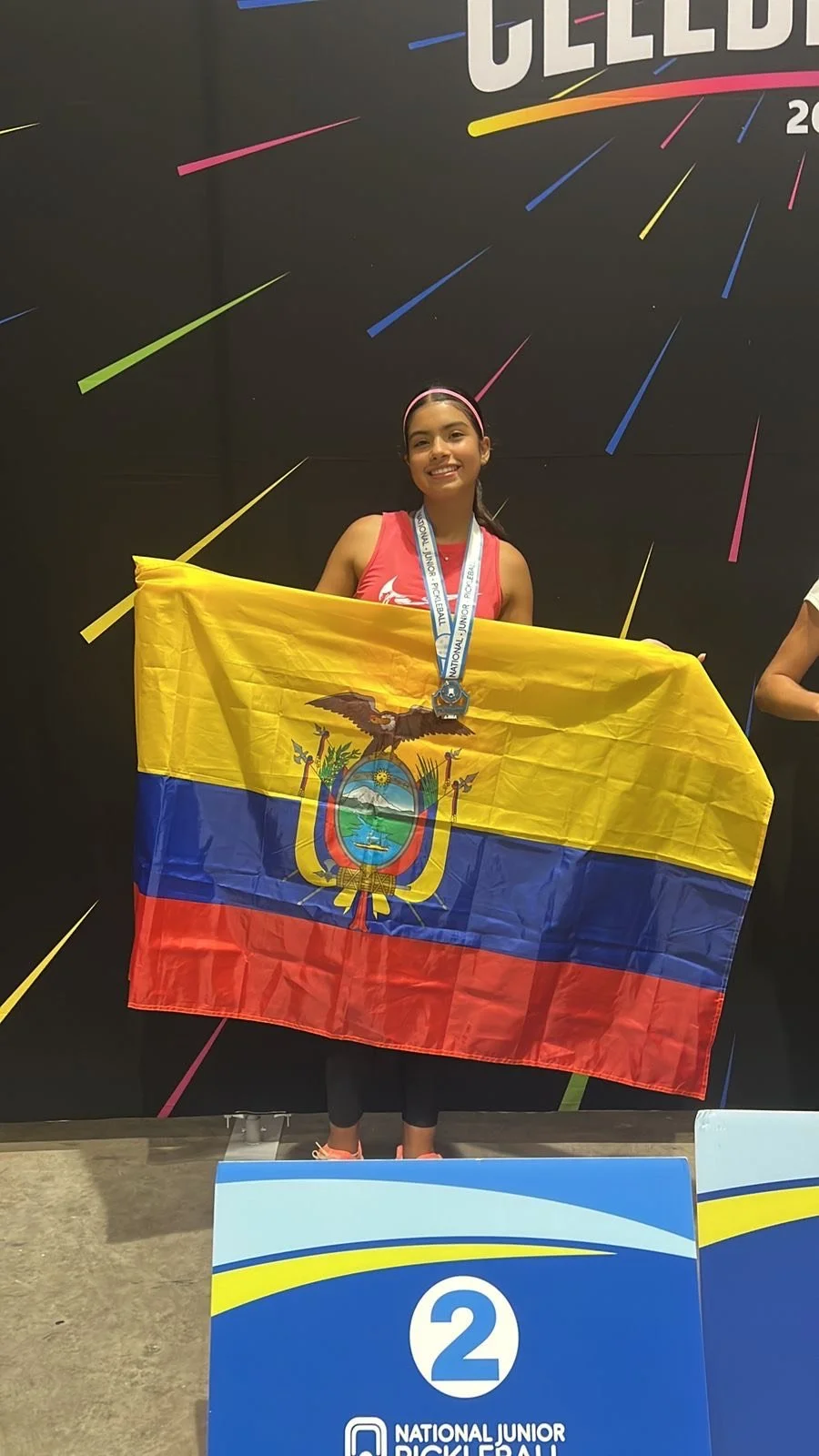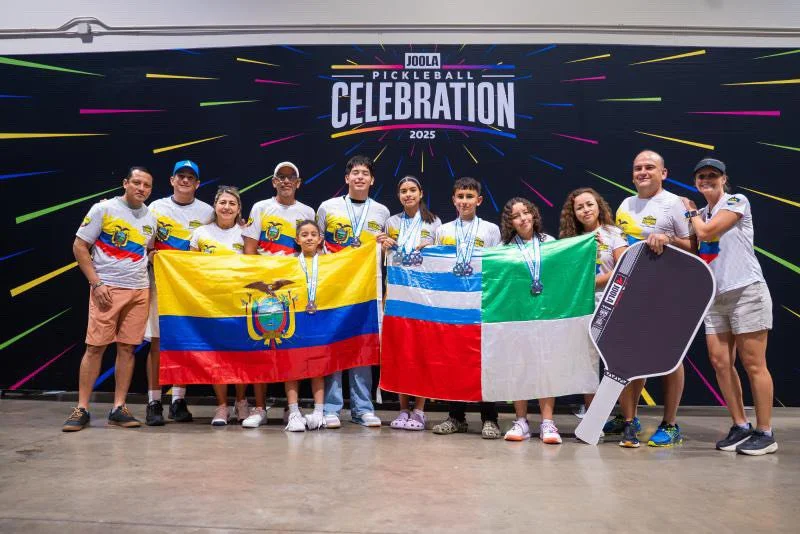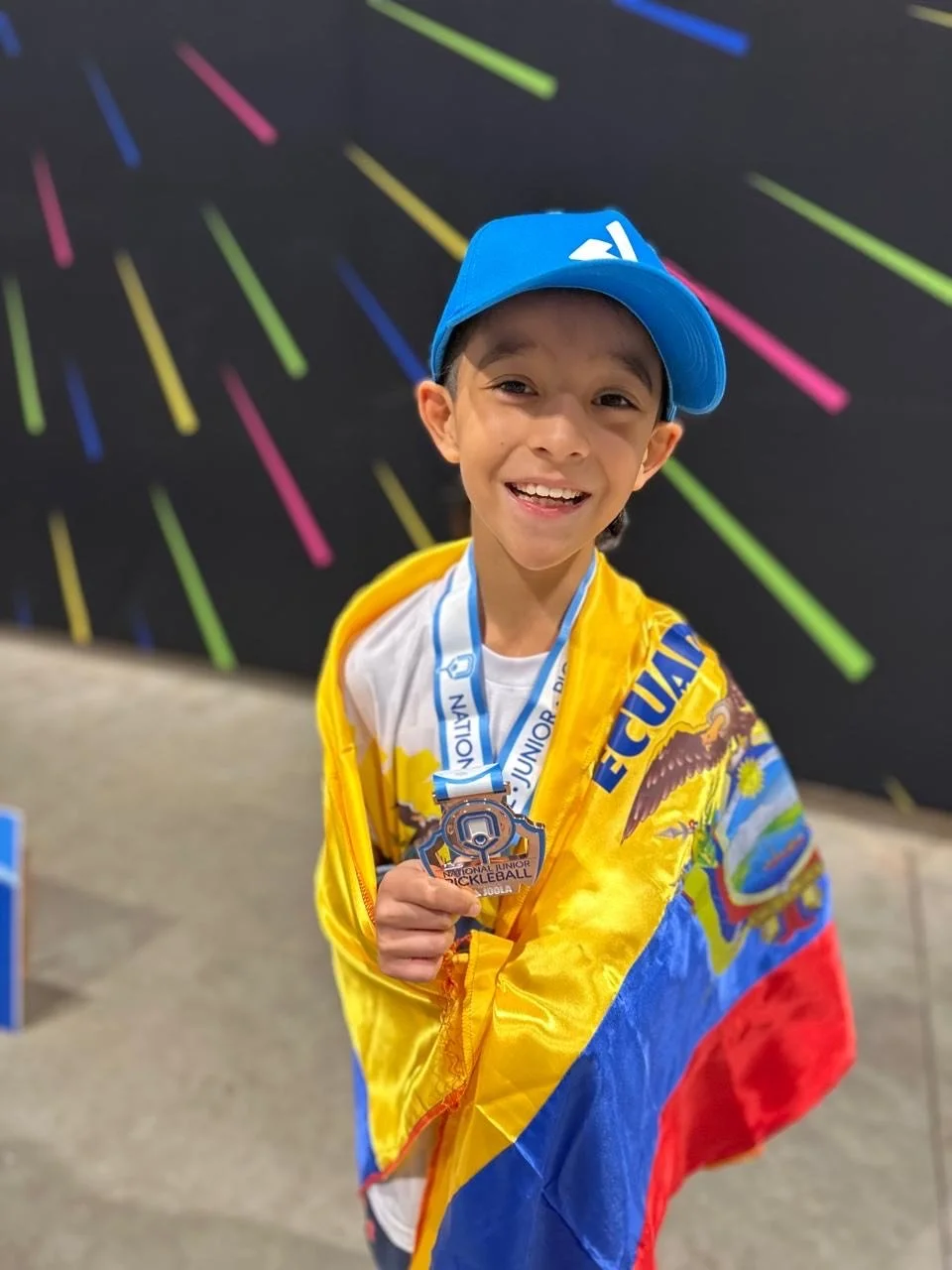From Backyard Court to Global Stage: How One Ecuadorian Club Is Raising the Next Generation of Players
When five kids from a small city in Ecuador walked into the National Junior Pickleball JOOLA Celebration in Florida, they were carrying more than paddles and passports.
They were representing a place where pickleball is already a school sport, where eleven permanent courts sit in a gated complex just fifteen minutes from the beach, and where a mom named Tamy Arboleda is quietly building a junior pipeline with whatever resources she can get her hands on.
We sat down with Tamy to learn how pickleball in Portoviejo went from a cracked backyard slab to one of the largest communities in Ecuador, and what it took to get those five kids to the United States.
It started with an earthquake and a Google search
Tamy’s husband and his friends playing on the backyard court in 2015.
Tamy’s story with pickleball does not begin at a fancy facility. It starts in 2015, outside Portoviejo, on a rural property where she and her husband lived with plenty of open space and a half-sized basketball court he had poured so he could shoot hoops.
Then a major earthquake hit and damaged the court. Her husband went looking for another sport that might fit the same footprint.
“He did a Google search,” Tamy said. “He asked, what other sport can I play in this size area? Pickleball came up and he said, ‘What is pickleball?’”
He and a friend stayed up until three in the morning watching YouTube, teaching themselves the rules. When COVID lockdowns began, that experiment turned into something bigger. Friends showed up. More people heard about it. Games that started with two guys and a laptop became a steady flow of neighbors dropping by to play.
But there was a problem: they were outgrowing the house.
Portoviejo needed to have a national tournament, and they tried to rent a tennis facility and tape lines. It was too expensive. So Tamy suggested something bolder.
“Instead of renting, why don’t you just put concrete and build courts" she told her husband. “We cannot fit all these people in the house anymore. Let’s see what happens.”
Tamy’s husband Jared and his best friend Damian began building a dream. They started 5 with courts, then expanded to eight. Today, FEP Pickleball Club has eleven permanent outdoor courts and one of the strongest pickleball communities in Ecuador.
Making pickleball accessible in a soccer-first country
In Ecuador, weekends belong to soccer. For a new sport to survive, it has to be both accessible and genuinely welcoming.
Tamy, her husband, and the FEP Pickleball team made deliberate choices on both fronts. Court time is six dollars per hour, per court. A group of six pays about a dollar each. Paddles and balls are available at the courts to use.
The club sits in a gated area where people can see their cars, bring their kids, and stay all evening. In a country dealing with serious security issues, that matters.
“When people are here, they say they feel secure and happy,” Tamy said. “My kids can run around, my car is not going to be stolen. They call it their second home.”
They also keep the first session simple. When someone new walks in, there is always someone—Tamy, her husband, or one of their partners—welcoming them and getting onto the court with them.
“We do not start with rules or scoring,” she said. “We say, do not worry, we will teach you. Just get comfortable with the ball and send it over the net.”
The result is a community of about 300 active players in a city of roughly 350,000 people. There are approximately 30 courts across the area, including plus 15 private courts. For a “small” city by Ecuadorian standards, Portoviejo has an outsized pickleball footprint.
Seven schools, fifty kids, and pickleball in PE class
A proud moment for the FEP Pickleball team. After traveling from Portoviejo to Orlando, the juniors proved that grit and community can lead to the podium.
Where Portoviejo stands out even more is in schools.
Tamy and her FEP Pickleball team went directly to middle schools, high schools, and a major local college with a simple pitch: bring your students, try this sport, and we’ll provide everything.
For the first three months of the club, play was free.
Today, Tamy says seven educational centers have courts and include pickleball as an official option in physical education. Students can choose it the same way they might choose soccer or basketball. At the college level, future PE teachers are now learning how to teach pickleball along with traditional sports.
On the junior side, about 50 kids between ages five and eighteen are actively playing in Portoviejo. Many are the children of parents who already play. Some come from families where no one else touches a paddle, but the kids show up anyway because they love it.
For Tamy, this is the heart of the work.
“Kids now want tablets and phones,” she said. “We are giving them another option. At our courts you don’t even have to buy a paddle. You just come, and it is included.”
Pickleball nights have changed family routines, too. She talks about one husband whose “guys night” on the courts used to be his weekly escape.
“Now he is laughing because his wife learned the sport and invites her friends,” she said. “He cannot get rid of them. For us, that is the goal.”
How five kids from Ecuador made it to the NJP JOOLA Celebration
Two months before the National Junior Pickleball JOOLA Celebration in Florida, Tamy stumbled across the event online. Her son, Davide, had just turned eight and was eligible.
She could have made it a one-family trip. Instead, she opened it up.
“I did not want it to be only about my son,” she said. “I wanted other kids to have this opportunity.”
It takes a village to raise a pickleball player. Parents and juniors from the FEP Pickleball Club gather together in Florida, proving that the sport is just as much about the shared journey off the court as the matches played on it.
She created a WhatsApp group, called every parent she knew whose children were playing, and announced free Saturday training for anyone considering the trip. Within two months, five juniors and their families were committed. Most parents came along. In one case, neither parent plays pickleball, but they wanted their kids to experience something beyond their local courts.
Travel was still a stretch. Even with a nearby international airport that flies directly to Orlando, tickets and logistics were a lot to manage. Once they arrived, the learning continued.
The courts felt different. At home, Portoviejo’s concrete is smooth and slick. In Orlando, the surface was rough. Davide, who also plays hockey and is used to sliding on his knees, quickly learned that move does not end well on a scratchy U.S. surface.
The language barrier added another layer. Not all of the kids speak English. And at NJP, parents are intentionally taken out of the equation.
“The kids do everything,” Tamy said. “They register themselves, report the score, talk to the organizers. Parents cannot say anything while they are playing. It is all about the kids.”
For families who are used to doing everything for their children, that was a big shift.
Responsibility, resilience and real-world lessons
Small city roots, global dreams. Davide brings a piece of Portoviejo to the podium. For these juniors, the experience went far beyond the score sheet, building confidence that will last long after the tournament ends.
The event delivered more than drills and medals. It delivered some hard but valuable moments.
In one match, an opponent misreported the score against Davide. By the time he realized it and went to the referee, it was too late to change the result. He left the court in tears.
“We told him, this is your first experience,” Tamy said. “Next time you have to speak up in the moment.”
At the World Cup later on, he did exactly that. He tracked the score carefully, advocated for himself when needed, and walked straight to the referees at the end to shake hands, a habit he picked up after watching another junior get recognized for her sportsmanship.
At NJP, Skechers gave out shoes not to the best player, but to the kid with the best spirit. A young girl won because she thanked the referees every time she left the court.
“These are things many adults here have never experienced,” Tamy said. “The kids are learning to be fair, to be independent, to enjoy the game without pressure, and to meet other kids from all over the world.”
There were lighter moments too. After long days of matches, the kids still wanted to keep playing, hit the pool with new friends, and draw up strategy as a team. For Tamy, that was the real payoff.
“That was priceless,” she said. “They did not know each other before and now they are planning together.”
A city of sports and an official home for pickleball
Portoviejo itself has leaned into sport as part of its identity. After the earthquake, local leaders pushed to rebuild community spirit through athletics.
Last year, the city entered a competition to be recognized as the sports capital. Delegates from Europe visited facilities across town. They saw soccer and basketball, then stopped at FEP Pickleball club, where both pickleball and hockey are played.
“They fell in love with it,” she said. “These are sports that are not common here.”
Portoviejo ultimately won recognition as a city of sports. Since then, the municipality has backed major tournaments at FEP Pickleball Club with security, event presence and prize support. The national Ministry of Sport has also formally recognized the club, even though pickleball is not yet an Olympic discipline. When the club celebrated its second anniversary in August, the head of the sports ministry in the province attended in person.
For a smaller city that sits behind Quito and Guayaquil in size, it is a big statement. In pickleball, Portoviejo is punching well above its weight.
Where Ecuadorian pickleball goes next
For all the progress, the barriers are real.
Good paddles are expensive. At the NJP event, referees flagged Davide’s paddle as a cheap, non-approved knockoff. He had won it as a prize at a local event, but it did not meet the standards. Fortunately, he was able to borrow his dad’s CRBN paddle and adjust on the fly. Not every kid would have that option.
JOOLA has donated 32 paddles to the club, which helps. Courts and coaching exist. What is missing, more than anything, is funding for travel and higher-level competition.
“I know not all kids can afford to travel,” Tamy said. “My goal is to be able to say, this kid really deserves to go, and we have the money to bring them, not only the ones whose parents can pay.”
She also wants to sharpen the level of play. In Ecuador, many players come from tennis or padel and prefer standing back and hitting hard. In the United States, she noticed how much more time is spent in the kitchen, how often players use dinks and soft shots to build points.
Her husband has been telling local players the same thing for years.
“He says pickleball is eighty percent in the kitchen,” she laughed. “People here still want to hit every ball hard. When they travel and see how the game is played there, they understand.”
Tamy, Jared, and Davide snap a photo with world #1 Ben Johns. For a kid who started on a home-poured concrete slab, meeting the best in the game shows just how small—and welcoming—the pickleball world really is.
Culturally, though, the vibe is familiar. After-work runs with coworkers at six o’clock, girls night dedicated to laughing more than ladder results, weekend family times on the courts.
“It is very social here too,” she said. “More about being together than trying to be pro.”
Why this story matters
Tamy will be the first to say she is not doing this alone. Her husband, her partners at the club, the expat community, local government, brands like JOOLA, Selkirk and CRBN, and dozens of Ecuadorian families are all part of this story.
But every growing sport depends on people who quietly do the heavy lifting.
In Portoviejo, that looks like a former exchange student who speaks English and Spanish, who is willing to walk into ministries, set up WhatsApp groups, and shepherd nervous families through the process of flying their kids to a junior tournament in another country.
It looks like eleven permanent courts in a gated complex where parents feel safe, seven schools where kids can list pickleball as their sport, and one little boy learning to shake a referee’s hand after a tough match.
As juniors carve out space on the global stage, stories like this are a reminder: growth is not only happening on center court. It is happening in small cities where kids trade screen time for paddles, where moms learn their first sport alongside their daughters, and where a community has decided that a pickleball club can be a second home.
And in one corner of Ecuador, that decision is already changing what is possible for the next generation.







